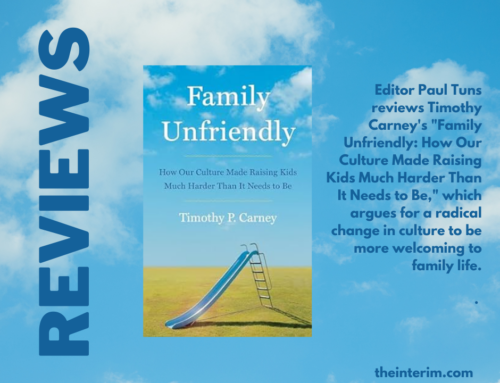An anti-euthanasia group says poll results from a survey they commissioned earlier this year illustrate there is no way to provide safeguards to protect those vulnerable to euthanasia and that many Canadians have a eugenic attitude when it comes to people with disabilities.In April, the Euthanasia Prevention Coalition (EPC) collaborated with the Environics Research Group on the Focus Canada Omnibus Survey of 2035 Canadians. EPC executive director Alex Schadenberg told The Interim the poll illustrated “that if euthanasia or assisted suicide were made legal, there is no possible way there would be adequate safeguards to protect the vulnerable.” Nearly half (47 per cent) of Canadians support euthanasia when someone is in the final stages of a terminal illness and is unable to express his wishes, but his care givers want to take his life; 38 per cent said doctors should be permitted to substitute their own judgement about when to stop treatment for disabled, critically ill or dying patients over the expressed wishes of the patient or his family. “The only way to protect vulnerable Canadians is to keep euthanasia and assisted suicide illegal,” Schadenberg said. The poll also found that 58 per cent of respondents oppose “mercy killing” when a parent of a severely disabled child wishes to take the life of their child, as in the case of Robert Latimer. That number is slightly lower than other polls taken specifically about the Latimer case after the Supreme Court handed down its decision in January. Jean-Marc Leger, president of Leger marketing, was quoted in a Canadian Press story saying, “It’s very, very clear that high profile cases in Canada [such as Latimer and Sue Rodriguez] have touched Canadians.”
On July 1-2 many Canadian newspapers ran stories trumpeting the finding of a Leger Marketing poll which found that 75.5 per cent of Canadians believe that someone who helps end the life of a loved one suffering from an incurable and extremely painful illness should not be prosecuted. But the Leger poll was skewed, because it presented the worst-case scenario. Schadenberg told The Interim that such cases – terminally ill patients suffering extreme pain – need not happen, because proper palliative care can relieve most suffering. “If anyone finds themselves in such a situation, they should call a lawyer.” Reacting to the Leger poll, EPC president and retired paediatric oncologist Dr. Barrie deVeber, criticized how the question was posed. He said if Canadians are given a choice between extreme pain and death, it is hardly surprising many will choose death. “The real question is, ‘Do Canadians want proper pain management or ‘mercy killing’?” According to deVeber, 95 per cent of pain can be treated. But despite the problems with its question, the Leger poll confirms the finding of at least one aspect of the EPC-Environics poll – many Canadians support euthanasia because they believe that current levels of long-term and end-of-life care are inadequate. The EPC-Environics poll found 72 per cent of respondents said that if people with disabilities or a chronic or terminal illness had access to adequate pain management and social services, the perceived need for euthanasia would decrease. Another 42 per cent said access to euthanasia is necessary because of inadequate nursing home and end-of-life care in Canada. Schadenberg said the comprehensive EPC-Environics poll, which recognizes subtleties in the euthanasia debate that a single extreme either/or question could not, taken with the Leger poll, “re-enforces the fact most Canadians support euthanasia because they do not want to suffer.” He reiterated Dr. deVeber’s call for governments to support proper palliative care and home care services instead of considering legalizing euthanasia. Schadenberg said the poll also illustrated the ugly truth about many Canadians, namely that they have “negative attitudes toward people with disabilities.” The poll found that 20 per cent of respondents thought that caring for people who are severely disabled or terminally ill was very expensive and that so-called mercy killing is a good way for the health care system to save money. Almost four in ten (37 per cent) supported euthanasia when a parent wants to take the life of a severely disabled child (active euthanasia). Schadenberg remarked, “On the one hand Canadians support wheelchair ramps but on the other, they don’t want to live near [disabled people] and seem eager to kill them.” Full polling results are available from the EPC for a donation of $50. Write to Box 25033, London, Ontario, N6C 6A8. |

 Schadenberg said the deep divisions within the country over the Latimer case illustrate it would be foolish for the Liberal government to grant the murderer clemency.
Schadenberg said the deep divisions within the country over the Latimer case illustrate it would be foolish for the Liberal government to grant the murderer clemency.


